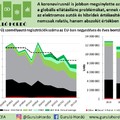The worse drought in the US in 50 years and sky-rocketing corn and food prices have called attention to the irrationality of biofuels again. But the truth is that ethanol and biodiesel have always been prohibitively expensive even without a drought, and not a good way to reduce CO2 emissions. Now would be (politically) the best time to stop forcing people to use them.
Biofuels policies do more harm than good, and not just when a serious drought raises corn prices. This is one of the things in which even greens and oil companies agree. Biofuels in the US and Europe cost so much, that no one would use them without some form of state subsidies. The price of oil would need to grow to at least 200 USD/bbl, probably way more, for biofuels to cost the same in Europe as the fossil fuels.

Rapeseed. source: agribusiness.hu
Incredibly shrinking CO2 savings
German scientists have recently found that rapeseed biodiesel production in the EU generally saves much less CO2 than the Commission mandates, 30% instead of 35%. (The study is pretty interesting, it gives a good insight into where the emissions come from in the case of the biofuels. For example, would you have guessed that the largest single source of emissions in the whole lifecycle is the use fertilizers? The study does not take into account land use change as a source of CO2 emissions - with that the balance would probably be even worse.)
This is a new part in a typical EU-saga: First there was a mandate on biofuels. Then, because many started to question the environmental sustainability of biofuel production, the EU mandated how much CO2 savings the biofuels should bring. Now these mandates on the mandates are shaking, too, because studies have found lower actual savings. But fear not, because soon there will be mandates on the mandates on the mandates. At least in the usual EU logic. Instead of getting rid of the whole harmful stuff.
So is 30 or 35% much or little, do biofuels make sense? By themselves, these numbers are meaningless. What ultimately matters is the COST at which the CO2 reduction is carried out. And in that respect it does not even matter, whether it’s actually 30% or 35%, or even 40%. Biofuels cost so much that it is a very bad business, and this has been the case in the past several years, as I will show below.
Bio cost 75% more
One could think that as oil prices have increased in the last couple of years, biofuels have got closer to becoming economical. This is far from the case. Biofuels cost much more than oil products. The following chart shows the prices of biofuels in Western Europe compared to the fossil fuels. On average, both bioethanol and biodiesel has cost over 75% more than gasoline and diesel respectively, when we take into consideration the differences in energy content. There have hardly been months when biofuels were less than 50% more expensive (I truncated the chart at 300%, while the cost goes above 400% in 2008). The recent drought up till now did not make any discernible differences on the price comparison.
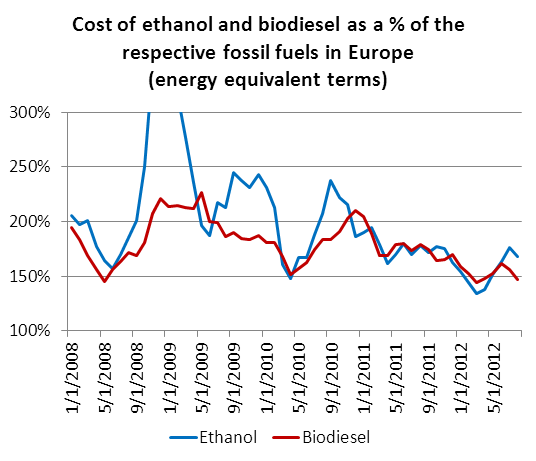
Source: own calculations based on Platts data on Rotterdam wholesale fuel prices. The energy content data come from the EC directive.
Oil prices could rise much more before biofuels become economical. With biofuels prices at their current level, oil prices should rise to 175 USD/bbl for biodiesel to break even, and to slightly over 200 USD/bbl for ethanol to break even. (I assumed the gasoline-oil price and diesel-oil price differentials – crack spreads, in the jargon - to stay at the current level in barrel terms, but these are an order of magnitude lower than the oil prices so they do not make a large difference in these calculations). This rule-of-thumb analysis is also naïve in the sense that it assumes that biofuels do not become more costly as the price of oil goes up. In contrast, a large chunk of the costs is probably linked to oil prices, from the cost of fertilizers to fuels used in harvesting and heating, etc.
Luxury weapon against climate change
The goal of renewables should be to cut CO2 emissions. When we translate the cost differentials on the chart above into the cost of CO2 emission reductions, we get the following:
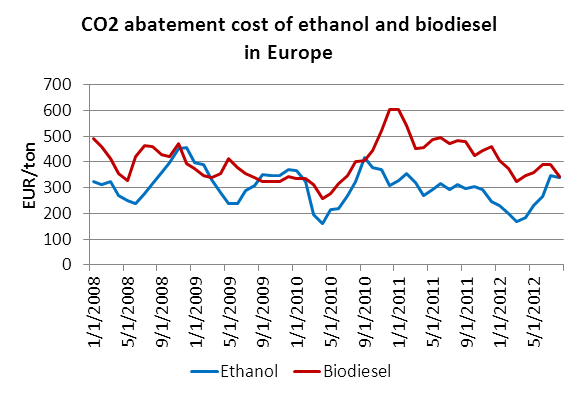
Source: own calculations based on Platts data on Rotterdam wholesale fuel prices. The energy content data come from the EC directive. The CO2 savings figures come from the EC directive (ethanol) and the Jena Research Paper (biodiesel).
Comparing these enormous costs (averaging 300 EUR/ton for ethanol and 400 EUR/ton for biodiesel over the past years) to the current market price of 8 EUR/ton, and a number of options costing well below 50 EUR/ton, this still looks an extremely expensive way of cutting CO2 emissions.
For regular readers of our blog, these sentences might sound similar. Yes, this part comes almost word-for-word from a post I wrote on solar power a couple of months ago. But there is one major difference between biofuels and solar: first generation biofuel technology (distilling alcohol and getting oil from crops) is a mature one, with no large potential to improve, as opposed to fast developing solar technologies. So there is hardly any chance that the cost of reducing CO2 emissions would go down to an affordable level using European or US produced first generation biofuels, which consume valuable food raw materials.
Second generation biofuels, which would use mostly agricultural waste or non-food raw materials, could turn out to be a different story, but that is still mostly at the laboratory phase. (Waste cooking oils are already used, and count twice towards the EU goals and are thus a pretty good business...)
There is another implicit (but sometimes even explicit) goal of biofuels policies: supporting agriculture. The biofuel mandates create a rent, this will accrue where there is a bottleneck in the supply chain. With a bit of exaggeration anyone can build an ethanol distillation or biodiesel plant (and many have done so recently) so this is not a bottleneck anymore. The real bottleneck is the land where the corn or other feedstock can be grown - the rent will eventually go to the land owner. A few owners of large arable land - it is a misconception that the policies will benefit many workers in agriculture.
The policy of supporting a few land-owners reminds me of some kind of lottery: we take a small sum from many people and give it to a lucky few. Why give it to land-owners? Why not to busdrivers? Or garbage collectors? Or to energy economists?
So the policy-driven biofuels blending should be simply abolished. The problem is that the longer the system lives, the more entrenched it becomes, and I am sure the EU will not be more effective in putting an end to it than in the case of the (similarly extremely costly and irrational) Common Agricultural Policies…
It does not make sense in the US either
The irrationality of the US policies and the cost figures do not materially differ from the European ones. There have been much talk recently of a price parity reached between ethanol and gasoline in the US: “Ethanol, the best-performing energy commodity this year, is cheaper than gasoline, encouraging refiners to use the biofuel even if President Barack Obama’s administration ends a requirement to do so.”, wrote Bloomberg. This is only true if we compare a gallon of ethanol and a gallon of gasoline. But a gallon of ethanol contains around a third less energy than a gallon of gasoline. When you take this ‘slight’ difference into account, ethanol is also more expensive in the US, currently costing around 30% more. An energy equivalent gallon of ethanol costs 1 USD more than a gallon of gasoline. That’s an awful lot.
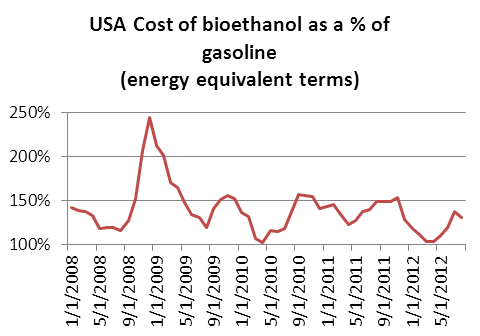
Source: Bloomberg, EIA. 1st month futures prices of RBOB Gasoline, NY Harbor and Fuel grade ethanol traded at the Chicago Board of Trade.
And again, what matters is the cost of CO2 reductions. And here the US figures are also pretty unfavorable (for easier comparisons I still report EUR/ton figures). Currently the cost of CO2 reduction is around 150 EUR/ton, over 180 USD/ton.
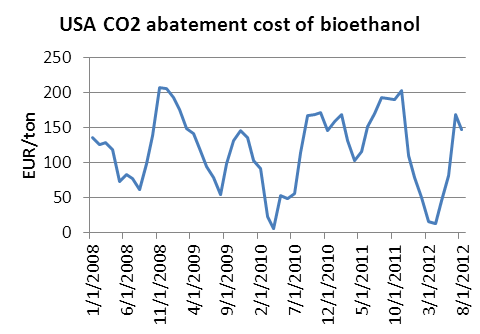
source: As of previous chart. CO2 reduction figures from US DOE.
Those who say that the biofuels would still be blended in the US even if the mandate ends think the customers can be easily tricked by the lower price tag (and way lower mileage). If you add more ethanol to the mix, your costs go down, because a gallon of ethanol costs less, but because it contains less energy, the driver will get a lower mileage. I don’t think the fuel sellers would risk a class action lawsuit. (Ethanol still might be used as an octane enhancer, but in much lower volumes - and probably not directly, but as ETBE, a component made from ethanol).
The recent drought and high corn prices have called attention to the irrationality of biofuels again. But the truth is that ethanol and biodiesel are extremely expensive even without a drought, as I have showed above. This is not something brand new: Five years ago I said biofuels were ‘irrationally expensive weapons to fight climate-change’. Nothing has changed, but the sums consumers spent on it have piled up. I would say it is time for Prohibition. But the nice thing is that you would not even have to prohibit, it would be enough to abolish mandates (stop forcing people to use them), and no one would use costly first generation biofuels any more in the US or Europe.
A bejegyzés trackback címe:
Kommentek:
A hozzászólások a vonatkozó jogszabályok értelmében felhasználói tartalomnak minősülnek, értük a szolgáltatás technikai üzemeltetője semmilyen felelősséget nem vállal, azokat nem ellenőrzi. Kifogás esetén forduljon a blog szerkesztőjéhez. Részletek a Felhasználási feltételekben és az adatvédelmi tájékoztatóban.


